The post Cambodia | Khmer New Year 2024 Findings appeared first on Indochina Research.
]]>Key findings:
- The generally positive economic outlook in Cambodia for 2024 likely contributes to the high number of people planning to celebrate Khmer New Year.
- Survey results suggest that Khmer New Year celebrations in 2024 might see a higher budget compared to 2023, with an average spend of USD 219 and plans for:
- Family gatherings would be done, and hence, cleaning houses is a key activity.
- There are significant shifts to the ways by which Khmers celebrate. For instance, fewer will travel to their hometowns or engage in traditional games.
- Purchases of products such as beverages and food seasoning/ cooking aids will be done by many Khmers.
Download the report now!
IRL Hotspot Study – Khmer New Year 2024

Please contact us for all your research projects in South East Asia
[email protected].
Indochina Research, Regional know-how you can trust!
The post Cambodia | Khmer New Year 2024 Findings appeared first on Indochina Research.
]]>The post Chỉ có 9% phụ nữ Việt Nam cảm thấy không an toàn khi đi một mình vào ban đêm appeared first on Indochina Research.
]]>46% phụ nữ trên toàn cầu không cảm thấy tự tin hoặc thiếu an toàn khi đi bộ một mình vào ban đêm ở nơi họ sinh sống
Theo khảo sát Win World Survey 2024, 46% phụ nữ trên toàn cầu không cảm thấy tự tin hoặc thiếu an toàn khi đi bộ một mình vào ban đêm ở nơi họ sinh sống. Kết quả thậm chí còn nghiêm trọng hơn ở một số khu vực địa lý nhất định: 64% phụ nữ ở Châu Mỹ cho biết không cảm thấy an toàn, 47% ở Châu Phi và 45% ở Châu Âu. Ở khu vực Trung Đông và Bắc Phi chỉ có 28% phụ nữ có cảm giác thiếu an toàn.
Khi xem xét chi tiết tình hình tại các quốc gia, khu vực Châu Mỹ Latinh, được coi là kém an toàn nhất, ghi nhận tỷ lệ phụ nữ không cảm thấy an toàn cao, với 83% tại Chile, 81% tại Mexico và 75% tại Ecuador. Ở Châu Âu, Ý (63%), Hy Lạp (62%) và Ireland (58%) ghi nhận tỷ lệ phụ nữ cảm thấy không an toàn cao, trong khi thậm chí ở Pháp (54%) và Vương quốc Anh (50%) cũng là điều đáng lo ngại.
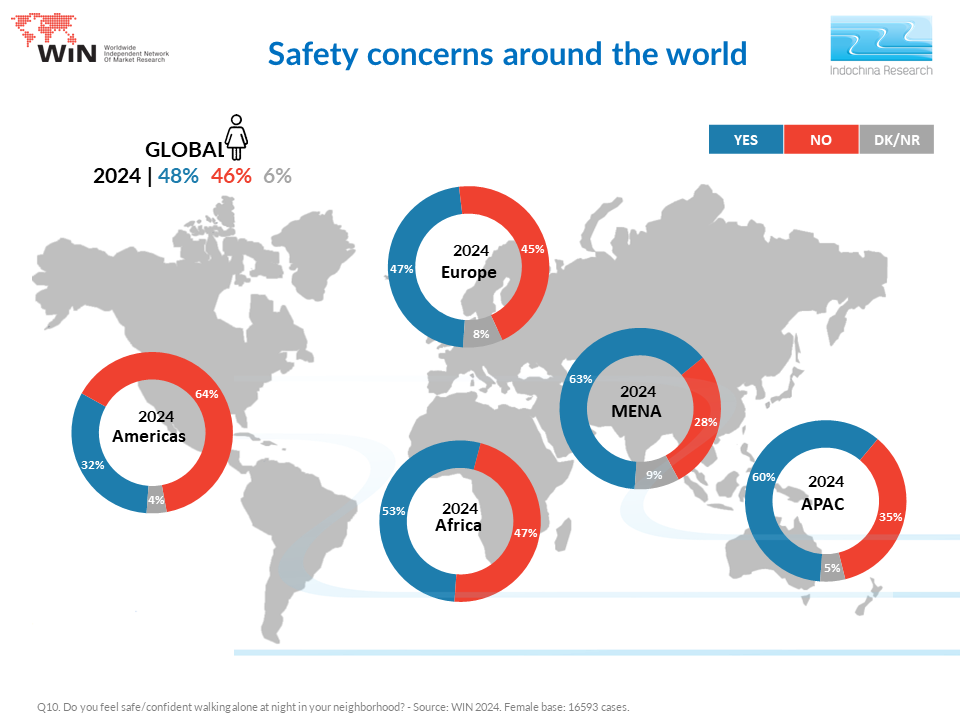
Đọc thêm: DO YOU KNOW: HOW MANY GENERATIONS ARE LIVING IN VIETNAMESE HOUSEHOLD NOWADAYS?
Việt Nam – đất nước đứng đầu với 91% phụ nữ cảm thấy an toàn khi đi ra ngoài một mình vào ban đêm
Khi nhắc đến vấn đề này tại khu vực Châu Á – Thái Bình Dương, Malaysia (56%) và Hàn Quốc (51%) là hai quốc gia ghi nhận tỷ lệ cao nhất, trong khi ở Việt Nam và Philippines chỉ có lần lượt 9% và 15% cho biết rằng họ cảm thấy không an toàn.
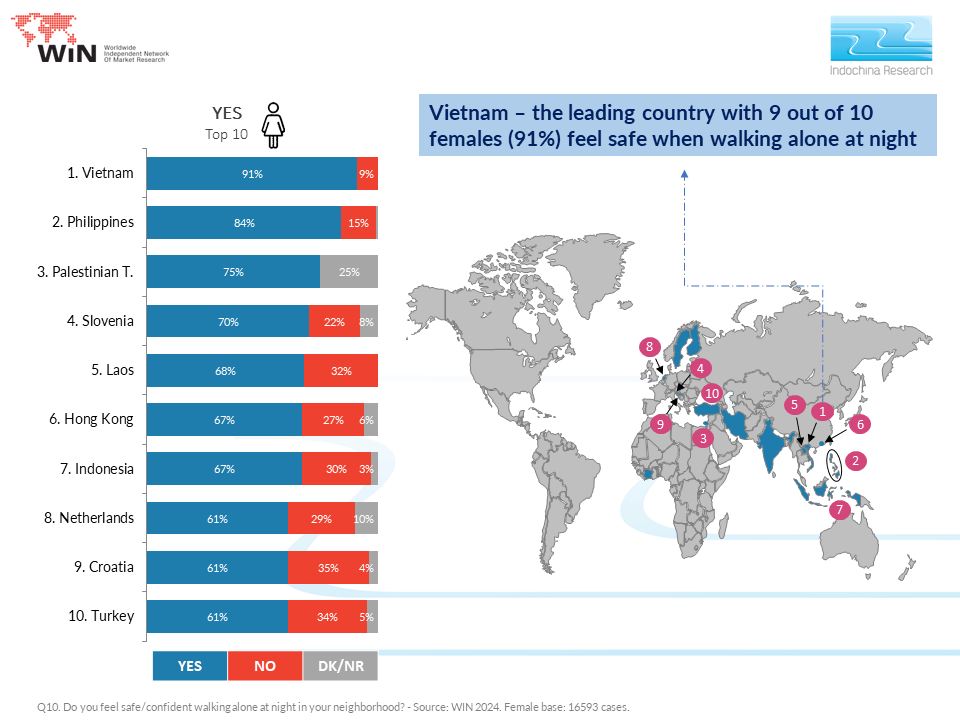
Như vậy, điều đáng chú ý mang tính tích cực là ở Việt Nam, 91% phụ nữ cảm thấy an toàn khi đi bộ một mình vào ban đêm trong khu vực cư trú của họ.
Nhìn chung, có thể kết luận rằng những người dân tại những thành phố lớn của Việt Nam đang cảm thấy yên tâm về vấn đề an ninh – trật tự tại khu vực họ sinh sống. Điều này không chỉ là một niềm tin cho cộng đồng mà còn là một tín hiệu tích cực khi nói đến chất lượng cuộc sống tại các thành phố lớn.
Như vậy, an toàn cho phụ nữ vẫn là một vấn đề nhức nhối mang tính toàn cầu cần sớm được giải quyết. Để tạo ra một môi trường sống an toàn và thoải mái cho phụ nữ, cả Việt Nam và các quốc gia khác trên thế giới cần tiếp tục nỗ lực, đẩy mạnh những biện pháp nhằm loại bỏ tệ nạn xã hội và các mối lo ngại về an toàn khác để phụ nữ có thể cảm thấy tự tin và yên tâm hơn về nơi họ sinh sống.
Đọc thêm: Safety in Vietnam: Is Vietnam A Safe Place to Live? – International Living
Methodology: The Win World Survey is global research conducted by independent agencies members of WIN Association. It provides a benchmark among more than 30 countries worldwide. In Vietnam, the market research was done among n=600 Vietnamese citizens living in Hanoi, HCM City, and Danang urban districts, aged from 18 to 64 years old, from December 2023 to January 2024.
Nếu bạn muốn thực hiện những nghiên cứu khác về phụ nữ hoặc các vấn đề khác trong xã hội, hãy liên hệ với chúng tôi qua email: [email protected]
Please contact us for all your research projects in South East Asia
[email protected].
Indochina Research, Regional know-how you can trust!
The post Chỉ có 9% phụ nữ Việt Nam cảm thấy không an toàn khi đi một mình vào ban đêm appeared first on Indochina Research.
]]>The post Only 9% Vietnamese women do not feel safe when walking alone at night appeared first on Indochina Research.
]]>46% of women globally do not feel confident or safe when walking alone at night in their neighborhood
According to the latest global survey results from the WIN Market Research Organization (Win World Survey – WWS 2024),46% of women globally do not feel confident or safe when walking alone at night in their neighborhood. Numbers are even more critical in certain geographical areas: 64% of women in the Americas report not feeling safe, 47% in Africa and 45% in Europe. However, in the MENA region only 28% of women share the same feeling.
Zooming into specific countries, Latin America regions are perceived as the least safe: 83% of women in Chile don’t feel safe walking alone, followed by 81% in Mexico and 75% in Ecuador. In Europe, Italy (63%), Greece (62%) and Ireland (58%) report the highest percentage of women feeling unsafe, but even in France (54%) and the United Kingdom (50%) the situation is concerning.

Read more: DO YOU KNOW: HOW MANY GENERATIONS ARE LIVING IN VIETNAMESE HOUSEHOLD NOWADAYS?
Vietnam – the leading country with 9 out of 10 females (91%) feeling safe when walking alone at night
In APAC, Malaysia (56%) and South Korea (51%) are the two countries with the highest percentage, while in Vietnam and in the Philippines, only 9% and 15% report feeling unsafe.

Thus, it is worth noting positively that in Vietnam, 9 out of 10 (91%) of women feel safe walking alone at night in their residential area.
In general, it can be concluded that people in large cities in Vietnam feel secure about security and order in the areas where they live. This not only boosts confidence within the community but also sends a positive signal regarding the quality of life in big cities.
However, women’s safety remains a pressing global issue that needs prompt resolution. To create a safe and comfortable living environment for women, both Vietnam and other countries around the world need to persist in their efforts and implement measures to eliminate social evils. This way, women can feel more confident and secure in their living spaces.
Read more: Safety in Vietnam: Is Vietnam A Safe Place to Live? – International Living
Methodology: The Win World Survey is global research conducted by independent agencies members of WIN Association. It provides a benchmark among more than 30 countries worldwide. In Vietnam, the market research was done among n=600 Vietnamese citizens living in Hanoi, HCM City, and Danang urban districts, aged from 18 to 64 years old, from December 2023 to January 2024.
If you want to do other research on women or other social issues, please contact us via email: [email protected]
Please contact us for all your research projects in South East Asia
[email protected].
Indochina Research, Regional know-how you can trust!
The post Only 9% Vietnamese women do not feel safe when walking alone at night appeared first on Indochina Research.
]]>The post Khảo sát hộ gia đình với quy mô 5000 mẫu tại Đồng bằng Sông Cửu Long appeared first on Indochina Research.
]]>Ngành thủy sản tại Đồng bằng Sông Cửu Long
Đồng bằng sông Cửu Long là một vùng đánh bắt thủy hải sản quan trọng của Việt Nam, duy trì sinh kế của nhiều cư dân, đặc biệt là những người sống tại Cà Mau (38%), Kiên Giang (16%), Bạc Liêu (15%) và Sóc Trăng (8%) – những tỉnh chủ yếu phát triển hoạt động ngư nghiệp. (Tổng cục Thống kê, 2016).
Tuy vậy, khu vực này phải đối mặt với những thách thức về sinh thái xã hội phức tạp. Biến đổi khí hậu, xâm nhập mặn, đánh bắt quá mức và suy giảm nguồn lợi thủy sản là những vấn đề môi trường có tác động trực tiếp đến quần thể ngư dân. Ngoài ra, những thay đổi về môi trường này góp phần gây ra những khó khăn về kinh tế xã hội, chẳng hạn như tình trạng nghèo đói và di cư ở nông thôn, do người dân đi tìm kiếm những cơ hội ổn định hơn ở nơi khác. Những thách thức này không chỉ làm gián đoạn năng suất nông nghiệp và thủy sản mà còn có nguy cơ khiến các cộng đồng cư dân phải di dời và cản trở sự phát triền của nền kinh tế chung của khu vực.
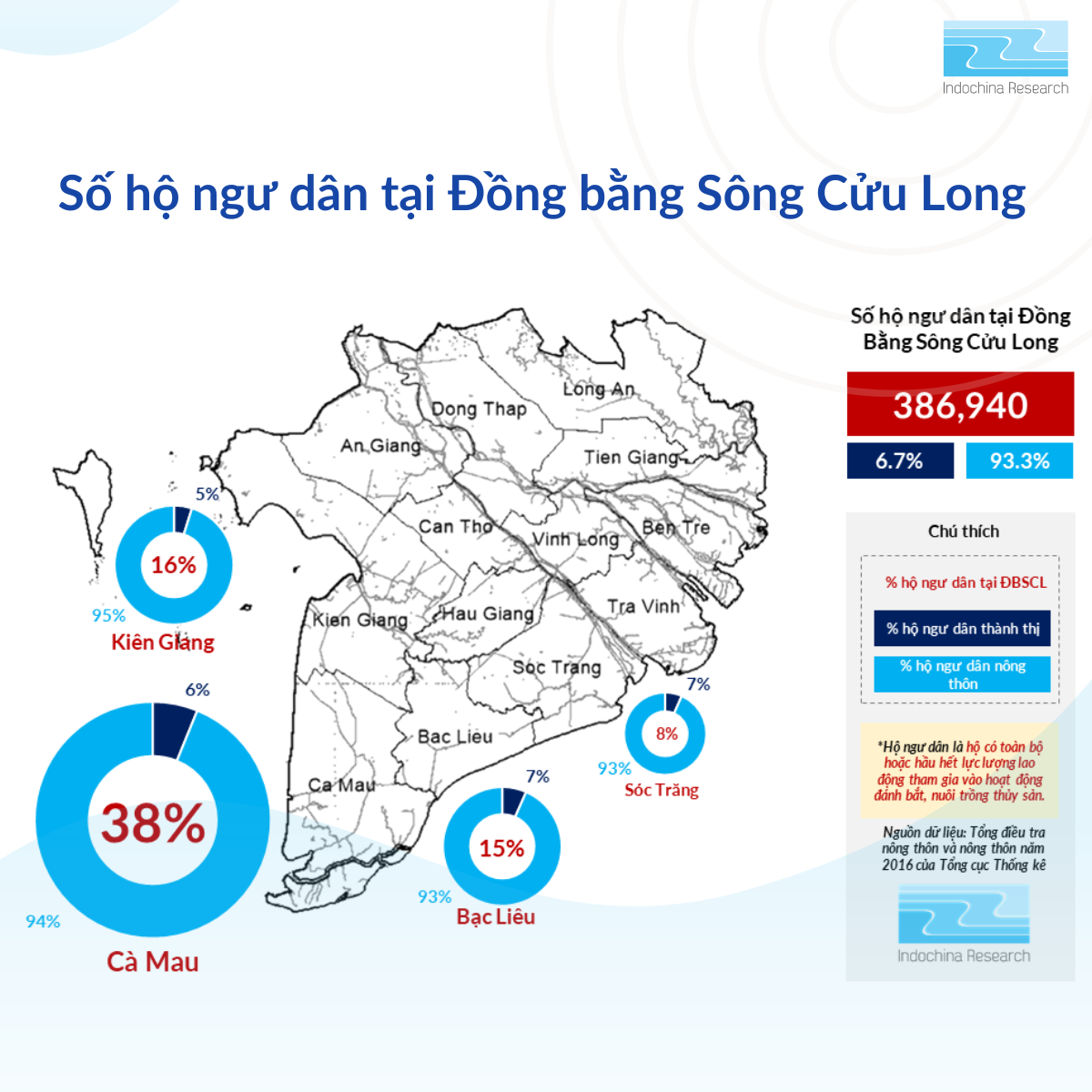
Các hộ gia đình nông nghiệp tại khu vực
Vùng Đồng Bằng Sông Cửu Long là nơi hội tụ của nhiều nền văn hóa, với sự phong phú được tạo nên nhờ nhiều dân tộc sinh sống tại đây. Ở trung tâm của các cộng đồng nông nghiệp, người Kinh (người Việt) chiếm ưu thế, rơi vào 91,6% dân số, và đóng vai trò then chốt trong nền kinh tế của khu vực. Xếp ngay sau đó là người Khmer, chiếm 7,9% dân số và đặc biệt phổ biến ở các tỉnh như Trà Vinh và Sóc Trăng. Sự hiện diện của họ giúp tăng thêm sự phong phú trong văn hóa của vùng đồng bằng.
Hiểu và đáp ứng các nhu cầu của vùng Đồng bằng sông Cửu Long đồng nghĩa với việc lắng nghe tất cả mọi người, kể cả các dân tộc thiểu số. Việc đảm bảo các kế hoạch và giải pháp bao hàm tất cả mọi người có thể giúp chúng ta xây dựng những chiến lược hiệu quả và công bằng cho toàn bộ cộng đồng. Phương pháp này là chìa khóa để vượt qua các thách thức của vùng đồng bằng và đảm bảo sự thịnh vượng.
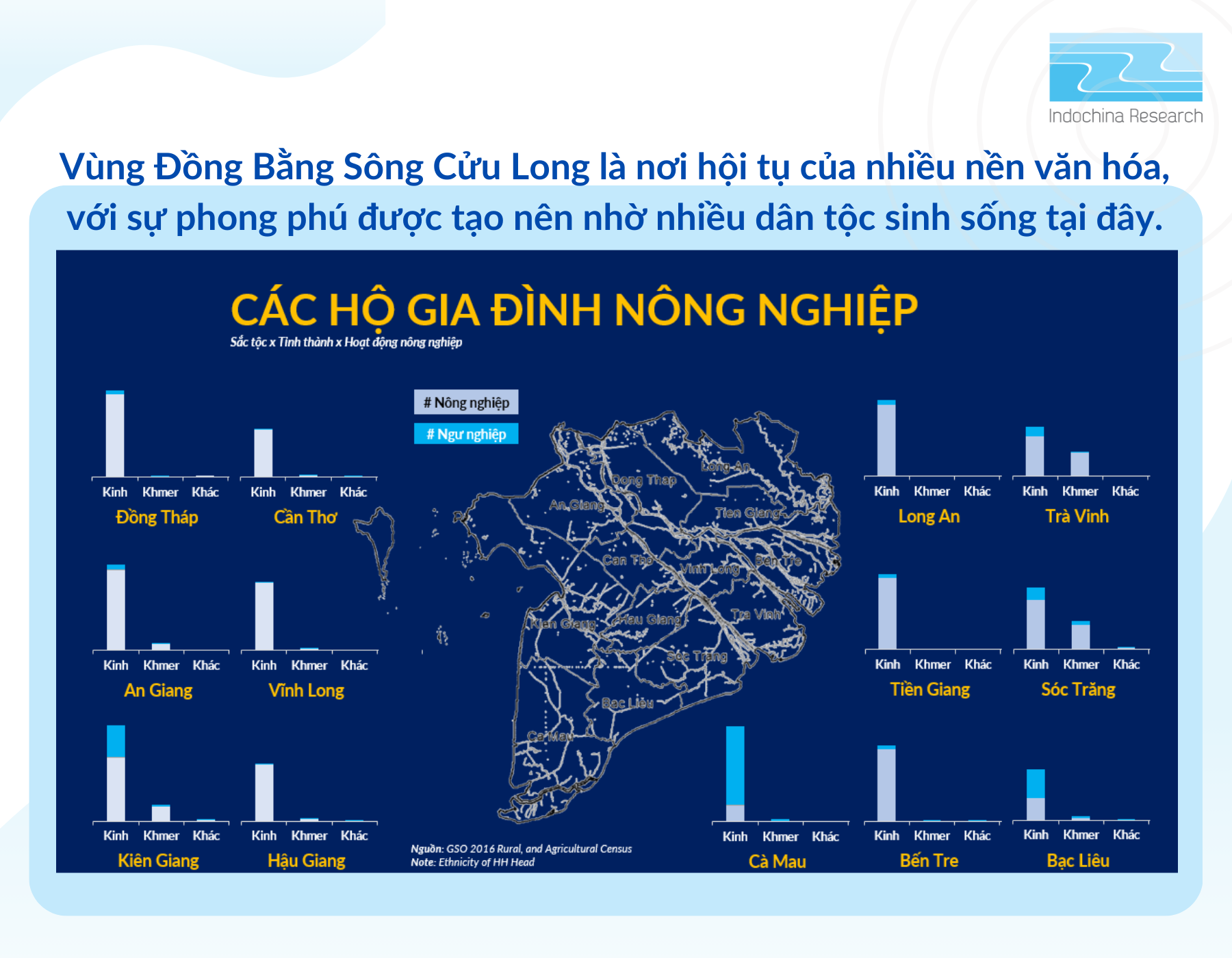
Các hộ gia đình đánh bắt thủy hải sản tại khu vực
Theo dữ liệu của cuộc điều tra Nông thôn và Nông nghiệp năm 2016 từ Tổng cục Thống kê, Cà Mau có số lượng hộ nuôi trồng thủy sản cao nhất, đạt 156,182 hộ, và dẫn đầu về hoạt động nuôi trồng thủy sản trong khu vực Đồng bằng Sông Cửu Long. Tuy nhiên, Kiên Giang lại đứng đầu khu vực với số lượng hộ ngư dân đánh cá đáng kể, lên đến 14,335 hộ.
Các hộ gia đình đánh cá ở Đồng bằng Sông Cửu Long đang sống dưới điều kiện xã hội-kinh tế khó khăn, trầm trọng hơn bởi sự suy thoái môi trường, trực tiếp ảnh hưởng đến thu nhập và lối sống của họ. Việc kiểm soát đánh bắt cá bất hợp pháp, không báo cáo và không quản lý (IUU) – bị cảnh cáo bởi Ủy ban Châu Âu – tạo ra thêm thách thức cho sinh kế của họ.
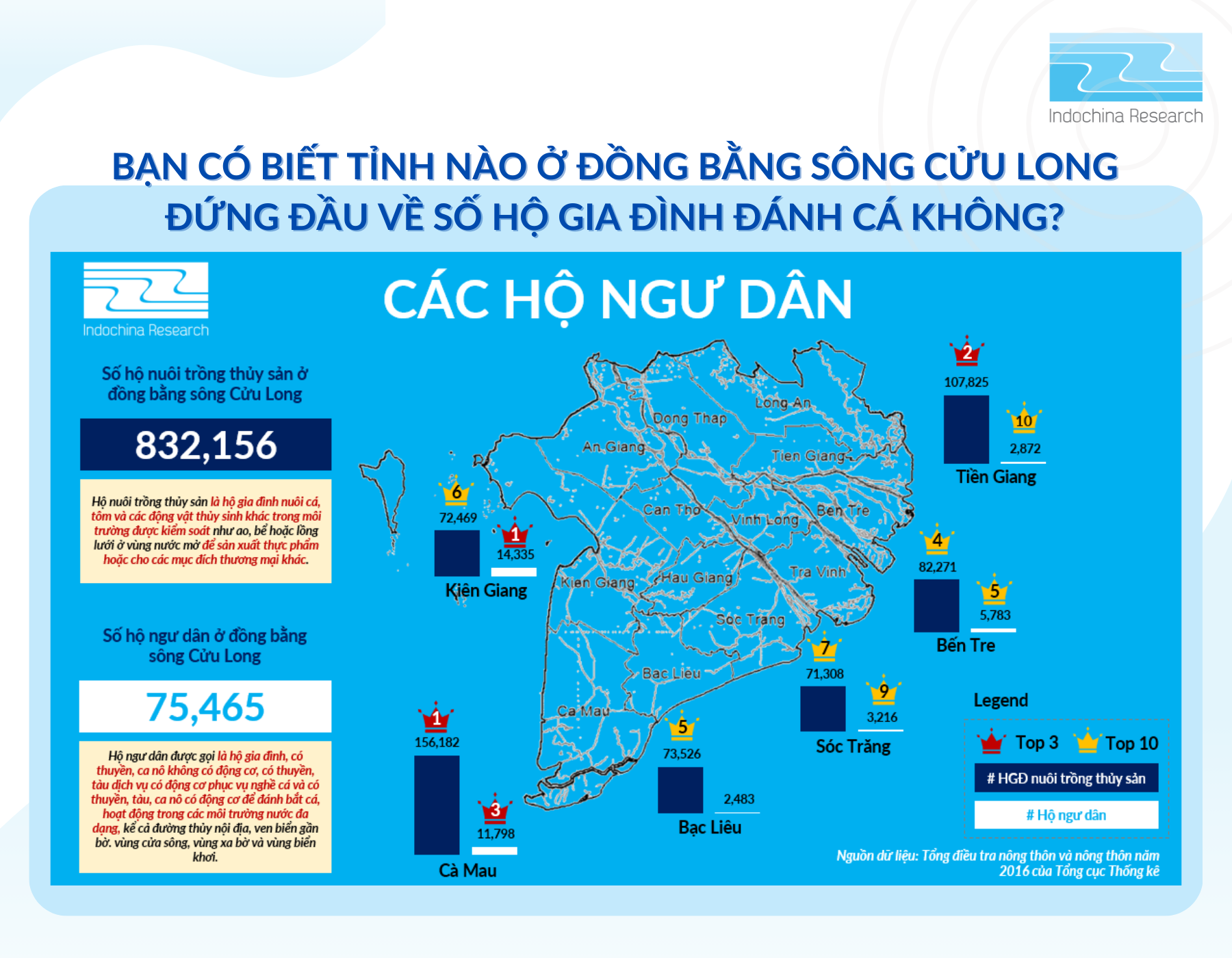
Để hiểu sâu hơn về điều kiện sống, quan điểm nghề nghiệp và triển vọng kinh tế của khu vực, Công ty Nghiên cứu Đông Dương (IRLVN) sẽ tiến hành một cuộc khảo sát hộ gia đình toàn diện với quy mô 5000 mẫu từ tháng 3 đến tháng 6 năm 2024. Cuộc khảo sát này nhằm thu thập dữ liệu cập nhật về cuộc sống của cộng đồng Đồng bằng Sông Cửu Long và quan điểm của họ về triển vọng kinh tế của khu vực. Dự án được thực hiện nhằm phát triển các chiến lược hiệu quả để nâng cao đời sống của cư dân địa phương và bảo tồn tính toàn vẹn sinh thái của Đồng bằng Sông Cửu Long.
Nếu bạn quan tâm đến những nghiên cứu của chúng tôi, vui lòng truy cập https://indochina-research.com/news/https://indochina-research.com/news/
Please contact us for all your research projects in South East Asia
[email protected].
Indochina Research, Regional know-how you can trust!
The post Khảo sát hộ gia đình với quy mô 5000 mẫu tại Đồng bằng Sông Cửu Long appeared first on Indochina Research.
]]>The post Do you know: How many generations are living in Vietnamese household nowadays? appeared first on Indochina Research.
]]>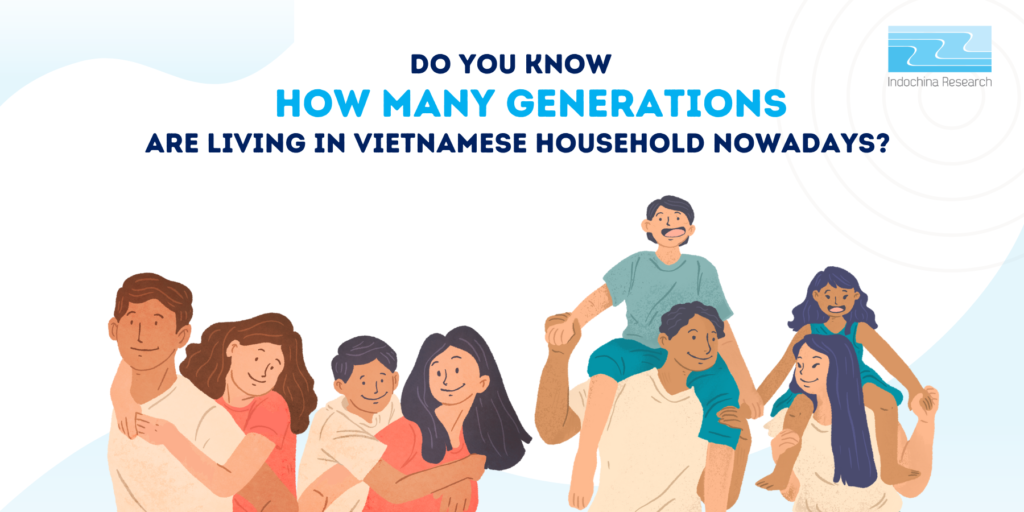
Family sizes can vary from one to three and even more generations in Vietnam. In key urban cities, nuclear families (2 generations) and extended families (from 3 generations upwards) are the most common types. More than 5 out of 10 of respondents now live in two-generation families, while still 4 out of 10 live in three or more generations beneath the same roof.
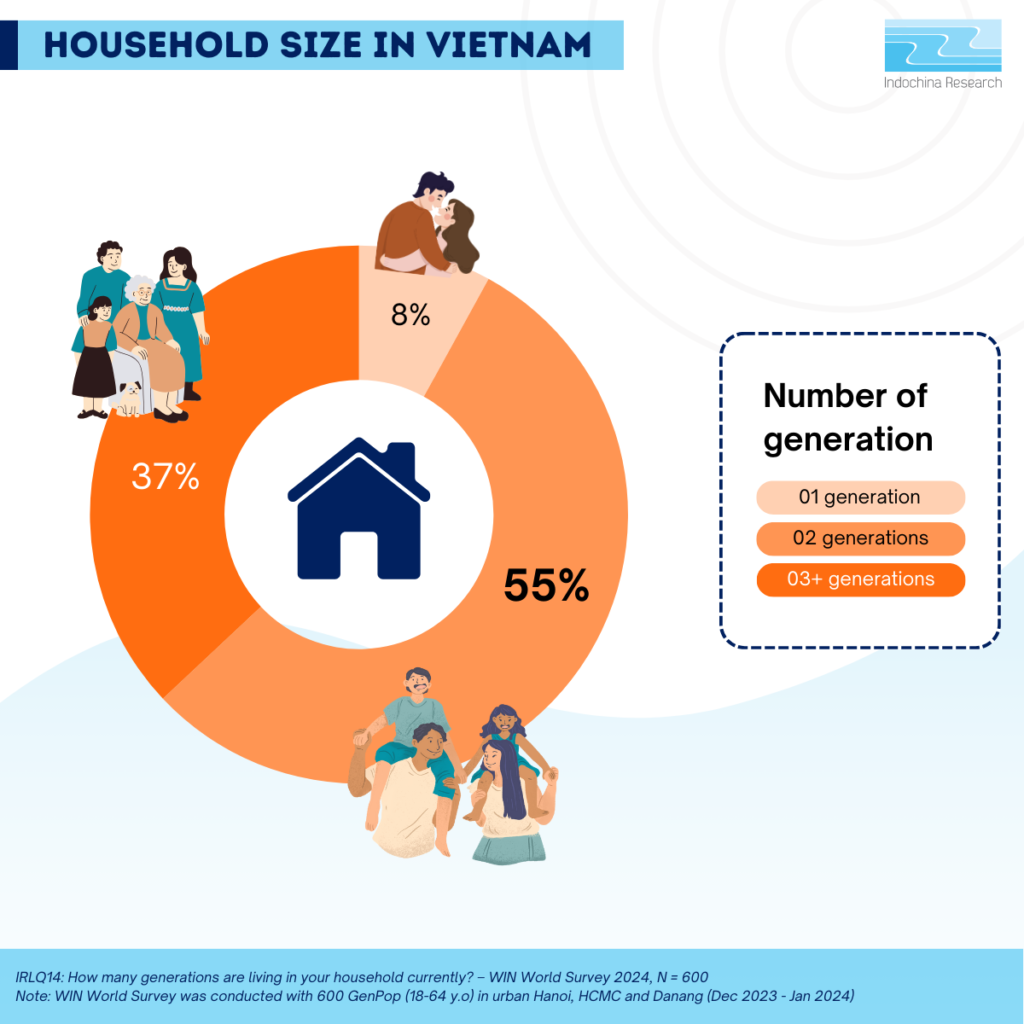
In Hanoi, most families (68%) live more independently with parents and kids only, making Hanoi the leader in the prevalence of nuclear families.
In Danang, most families (56%) adopt the same pattern. Nevertheless, extended families are also common there, and Danang tops the chart for having the highest share (44%) of families with 3+ generations among the three cities.
In Ho Chi Minh City, we measure a more balanced mix of both family types. About 48% live in two-generation families, and 42% have more than three generations. Notably, 10% revealed having only one generation. It’s a sign of many people coming from different areas to work and live, shaping the lively cityscape.
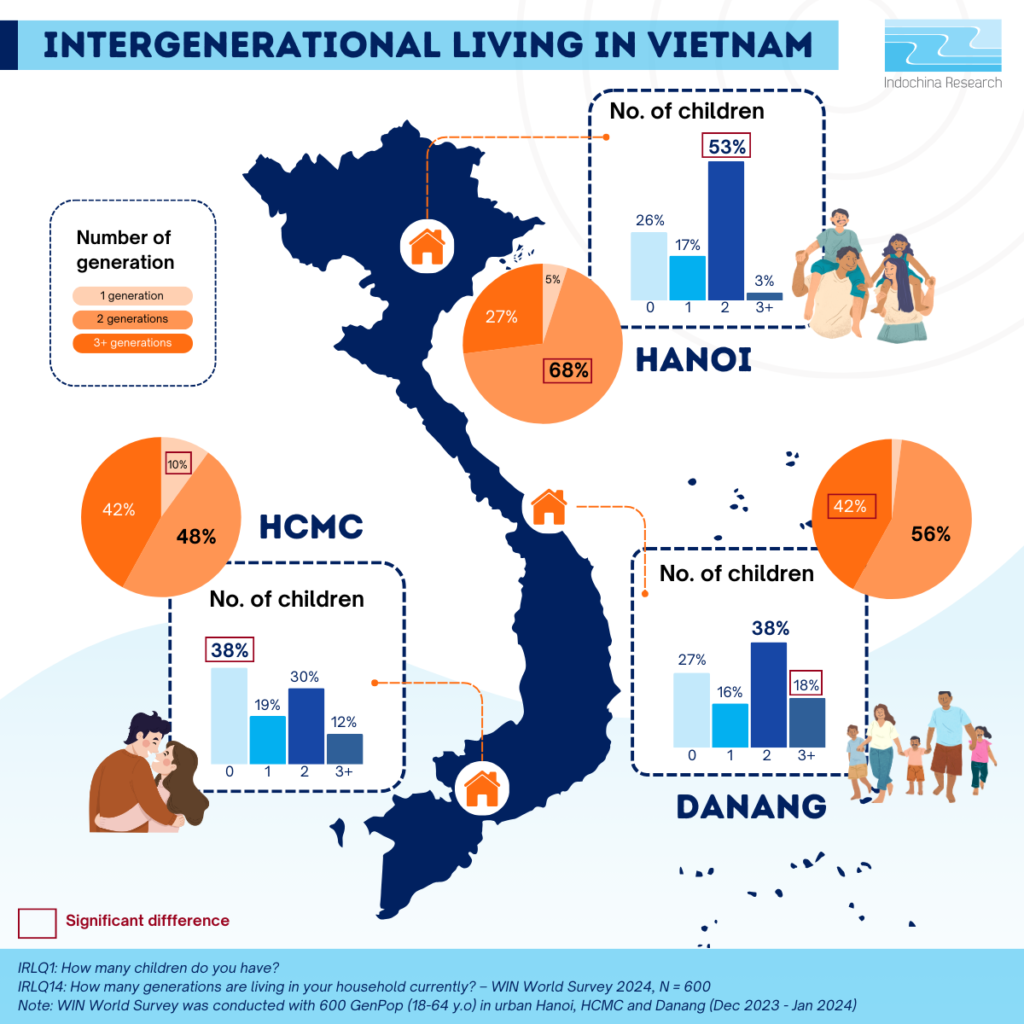
Thus, nuclear family with 2 generations is now the most common household size in key urban markets in Vietnam.
Have you enjoyed coming together and sharing good deeds among all generations of your family this recent Tet? Please share the delightful moments you’ve experienced with your family.
Source: Indochina Research Survey – January 2024
Methodology: The market survey is carried out by Indochina Research (Vietnam) Ltd. among a representative sample of n=600 Vietnamese citizens living in Hanoi, HCM City, and Danang urban districts, aged from 18 to 64 years old, from December 2023 to January 2024.
Should you have any questions or require further information, please do not hesitate to contact us at [email protected]
The post Do you know: How many generations are living in Vietnamese household nowadays? appeared first on Indochina Research.
]]>The post WIN APAC Regional Meeting in Vietnam 2023 appeared first on Indochina Research.
]]>
WIN APAC MEETING 2023
INNOVATION IN RESEARCH
31 OCTOBER 2023 | 8:00 AM – 03:30 PM | THE HANOI CLUB, VIETNAM
76 Yen Phu, Tay Ho Ward, Hanoi, Vietnam
The overarching theme, “Innovation in Research,” will be brought to life through presentations by research experts from the WIN Global Network and our esteemed partners.
We thank Win Global Network in APAC for being key part to the success of this event.
This event presents a unique opportunity to stay updated on best practices and innovations in the fields of marketing and social research, with a profound impact on decision-making and technology usage. We look forward to enriching our collective research knowledge and sharing valuable insights. As seating is limited, please register your attendance.
AGENDA
Should you have any questions or require further information, please do not hesitate to contact us at [email protected]
The post WIN APAC Regional Meeting in Vietnam 2023 appeared first on Indochina Research.
]]>The post Người Việt Nam nghĩ gì về cuộc sống hiện tại so với cuộc sống của cha mẹ mình ngày xưa? appeared first on Indochina Research.
]]>Hầu hết người Việt cảm thấy rằng họ đang sống cuộc sống tốt hơn so với cha mẹ mình.
Theo khảo sát toàn cầu do Hiệp hội Quốc tế Gallup (GIA) thực hiện năm 2022, cứ hai người (51%) thì có một người tin rằng cuộc sống của họ bây giờ đang tốt hơn cuộc sống của cha mẹ họ ngày trước. Điều này đã thể hiện một cái nhìn tích cực hơn về cuộc sống của thế hệ ngày nay so với thế hệ trước.
Trong tất cả các khu vực, Nam Á là vùng có tỷ lệ cao nhất với 60% người dân tin rằng cuộc sống của họ tốt hơn cuộc sống của cha mẹ họ ngày trước. Trong số các quốc gia và vùng lãnh thổ Nam Á được khảo sát, Việt Nam là quốc gia lạc quan nhất, với 83% dân số chọn đáp án ‘tốt hơn’. Theo sát là Hàn Quốc (75%) và Pakistan (65%).
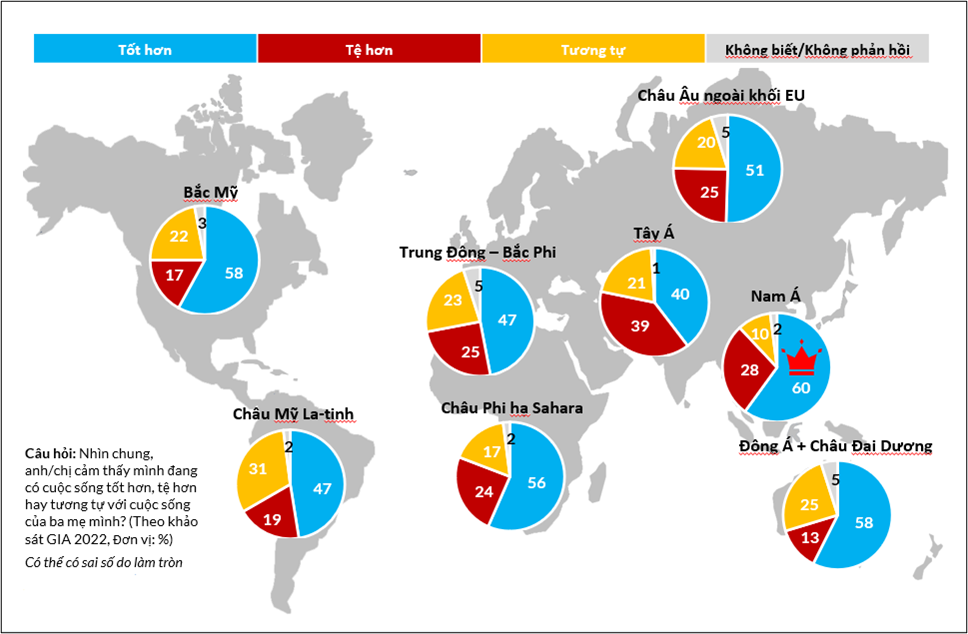
Cứ 10 người Việt Nam thì có 3 người cho rằng trẻ em hiện tại đang có cuộc sống tốt hơn họ ngày xưa.
Mặc dù Việt Nam đứng đầu trong các quốc gia Nam Á về mức độ hài lòng với cuộc sống hiện tại so với cuộc sống của cha mẹ họ (83%), nhưng người Việt vẫn không chắc chắn về triển vọng và cơ hội dành cho các thế hệ tương lai. Chỉ có khoảng 3 trên 10 người Việt Nam được hỏi (29%) tin rằng cuộc sống của con cái sau này sẽ tốt hơn cuộc sống của họ. Điều này chênh lệch đáng kể (54%) so với việc họ nghĩ rằng cuộc sống hiện tại của mình đã tốt hơn cuộc sống của cha mẹ ngày trước (83%).
Mặc dù không quá đáng kể nhưng các quốc gia và lãnh thổ khác trong khu vực cũng bày tỏ quan điểm về cuộc sống trong tương lai của con trẻ không khả quan tương tự như Việt Nam, chẳng hạn như Hàn Quốc (56%), Thái Lan (51%), Hồng Kông (48%), Ấn Độ (43%) và Nhật Bản (21%).
Điều thú vị là người dân ở Philippines (9%), Indonesia (7%) và Pakistan (4%) tin rằng tương lai của con cái họ sẽ tốt hơn chính mình. Điều này thể hiện sự lạc quan vào tương lai hoặc các vấn đề thực tế mà người dân nước họ mong muốn giải quyết cho thế hệ sau.
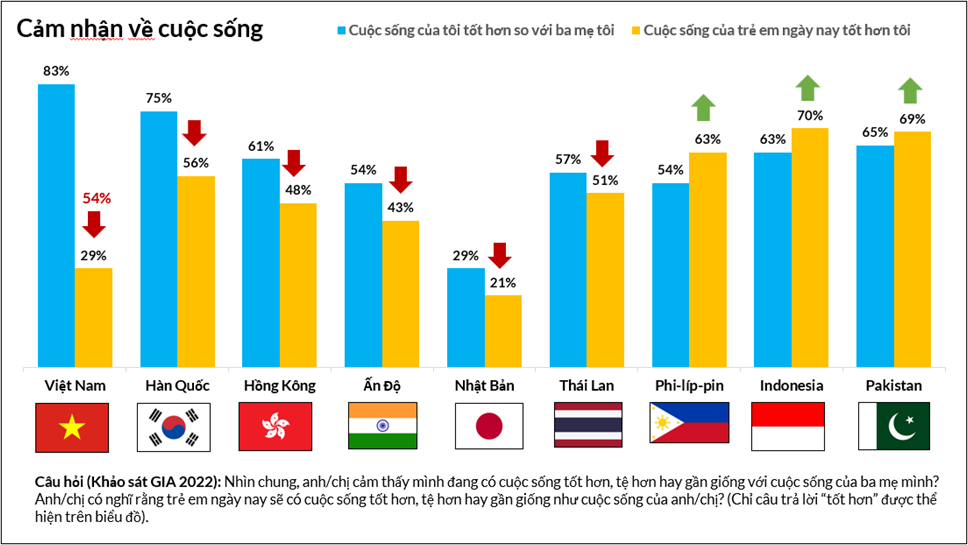
Nếu bạn quan tâm đến những nghiên cứu của chúng tôi, vui lòng truy cập https://indochina-research.com/news/https://indochina-research.com/news/
Để tham khảo thêm, vui lòng đọc:
- Khảo sát GIA (2022) là một cuộc thăm dò ý kiến toàn cầu do Hiệp hội quốc tế Gallup (GIA) thực hiện tại 64 quốc gia trong số 60,724 người tham gia từ tháng 8 đến tháng 10 năm 2022.
Please contact us for all your research projects in South East Asia
[email protected].
Indochina Research, Regional know-how you can trust!
The post Người Việt Nam nghĩ gì về cuộc sống hiện tại so với cuộc sống của cha mẹ mình ngày xưa? appeared first on Indochina Research.
]]>The post How do Vietnamese individuals perceive their own lives and the lives of their parents? appeared first on Indochina Research.
]]>Most Vietnamese think that they are living a better life compared to their parents’ lives.
According to the global survey conducted by Gallup International Association (GIA) 2022, one in two (51%) believes that their life is better than that of their parents. This could be interpreted as a positive outlook on their own circumstances compared to those of the previous generation.
Across regions, South Asia stands out with the highest proportion of individuals, at 60%, who believe that their life is better than that of their parents. Out of the South Asian countries and territories included in the survey, Vietnam emerges as the most optimistic, with 83% of its population selecting the option ‘better’. This is closely followed by the Republic of Korea (75%) and Pakistan (65%).
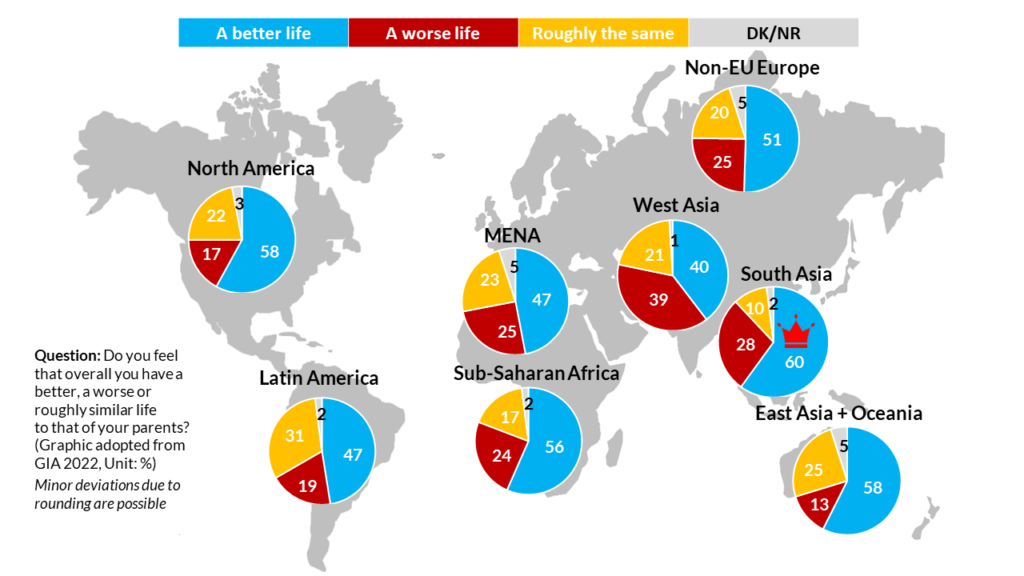
3 in 10 Vietnamese doubt that children will currently have a better life than they do.
Despite Vietnam’s top ranking (83%) in terms of satisfaction about their present lives, compared to their parents’ lives, among South Asian countries, they have doubts or uncertainties about the prospects and opportunities available to future generations. Only less than 3 in 10 (29%) Vietnamese respondents believe that their children’s lives will be better than their own, signifying a notable gap of 54 % points.
This less optimistic outlook regarding the future is also observed in other countries and territories in the region, though much less significantly, such as ROK (56%), Hong Kong (48%), India (43%), and Japan (21 %).
Interestingly, people from the Philippines (9% points), Indonesia (7% points) and Pakistan (4% points) consider the future to be brighter for their children that it is for them. This shows high optimism in the future or some actual difficulties that their countries’ population expect to be solved for the next generation.
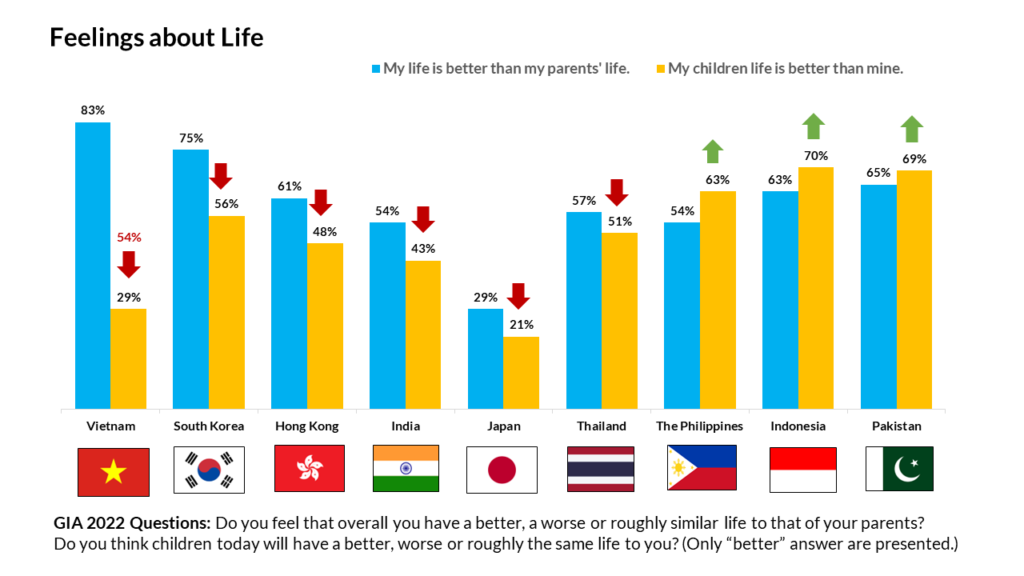
For any questions, feel free to contact us, or read our publications at https://indochina-research.com/news/
For further reference, please read:
- GIA survey (2022) is a global opinion poll conducted by Gallup International Association (GIA) in 64 countries (among 60,724 respondents) during August – October 2022.
Please contact us for all your research projects in South East Asia
[email protected].
Indochina Research, Regional know-how you can trust!
The post How do Vietnamese individuals perceive their own lives and the lives of their parents? appeared first on Indochina Research.
]]>The post Indochina Research Việt Nam & Điều tra Quốc gia về Sử dụng thời gian năm 2022 của Tổ chức Ngân hàng Thế giới appeared first on Indochina Research.
]]>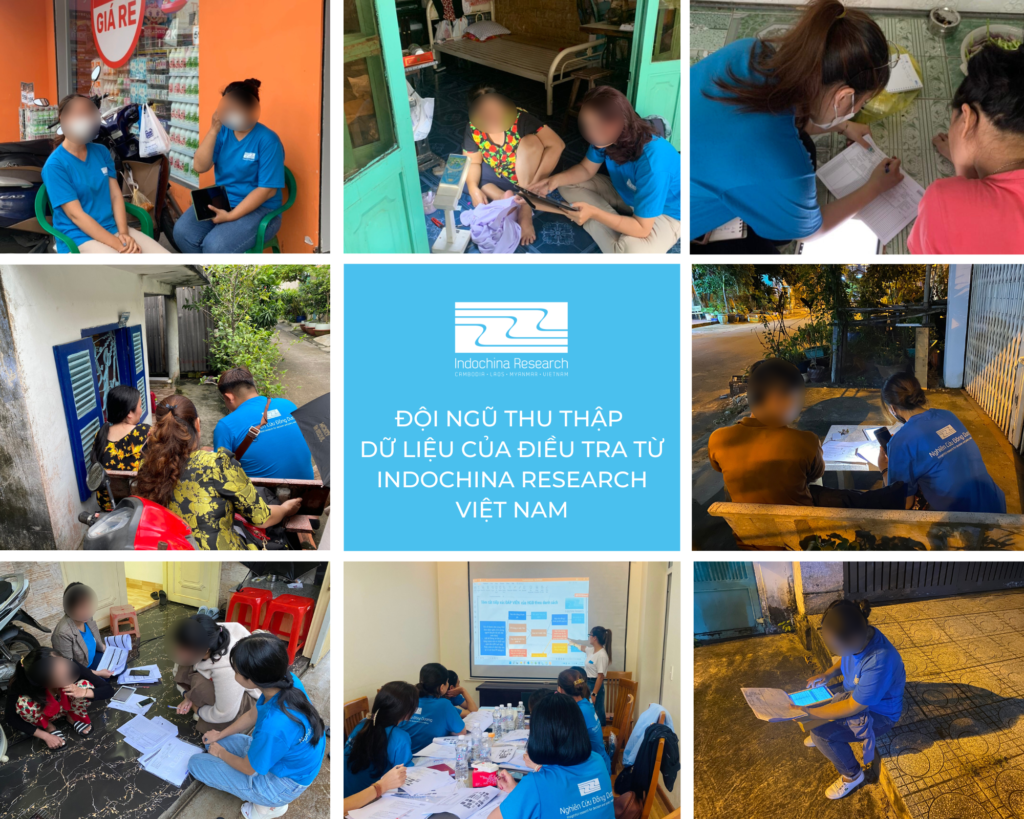
Phụ nữ dành thời gian cho những công việc không được trả lương gấp ba lần so với nam giới
Kết quả phỏng vấn 6.000 người trên toàn quốc cho thấy sự chênh lệch rõ rệt về việc phân bổ thời gian giữa công việc trả lương và công việc không được trả lương giữa nam và nữ.
- Phụ nữ làm việc nhiều giờ hơn nam giới, nhưng nam giới lại kiếm được nhiều tiền hơn bởi trung bình nam giới dành một giờ cho những công việc được trả lương còn phụ nữ phải dành ba giờ cho những công việc không được trả lương như nấu cơm, dọn dẹp, chăm sóc người già và trẻ nhỏ, v.v.
- Hầu hết nữ giới phải dành thời gian hàng ngày để làm việc nhà thì tỷ lệ này ở nam giới chỉ chiếm 55%.
- 45% nữ giới tham gia công việc chăm sóc gia đình, trong khi chỉ 24% nam giới thực hiện việc này.
- Do dành nhiều thời gian với các công việc trong gia đình, gần 1/3 phụ nữ không có thời gian giải trí trong ngày, trong khi nam giới dành nhiều hơn 1 giờ mỗi ngày so với phụ nữ cho việc chăm sóc cá nhân, ăn uống và ngủ nghỉ.
Indochina Research Việt Nam – Đội ngũ thu thập dữ liệu của Điều tra
Kết quả của cuộc khảo sát Điều tra Quốc gia về Sử dụng thời gian năm 2022 trở thành nền tảng để phân tích mối quan hệ giữa khoảng cách giới trong thời gian dành cho các “công việc không tên” và khoảng cách giới trong kết quả lao động của gia đình. Đồng thời, thông tin này sẽ giúp các nhà nghiên cứu và hoạch định chính sách trong việc xây dựng các khuyến nghị nhằm giải quyết những hạn chế về thời gian mà phụ nữ gặp phải, chẳng hạn như giảm gánh nặng của công việc chăm sóc không được trả lương, và cuối cùng là thúc đẩy bình đẳng giới ở Việt Nam bằng cách phát triển các dịch vụ mới liên quan đến chăm sóc trẻ em và chăm sóc người già.
Nếu bạn quan tâm đến những nghiên cứu của chúng tôi, vui lòng tham khảo tại: https://indochina-research.com/news/
Tài liệu tham khảo:
- Vietnam – Time-Use Survey 2022, truy cập tại https://microdata.worldbank.org/index.php/catalog/5844?fbclid=IwAR0VTUle0Bt9T_ide7wwXGGsHUoeOzXlZVy02FzU8ffElGMIzFseMetzNr8, vào ngày 02 tháng 06 năm 2023.
Please contact us for all your research projects in South East Asia
[email protected].
Indochina Research, Regional know-how you can trust!
The post Indochina Research Việt Nam & Điều tra Quốc gia về Sử dụng thời gian năm 2022 của Tổ chức Ngân hàng Thế giới appeared first on Indochina Research.
]]>The post Indochina Research Vietnam and Vietnam Time Use Survey 2022 by World Bank appeared first on Indochina Research.
]]>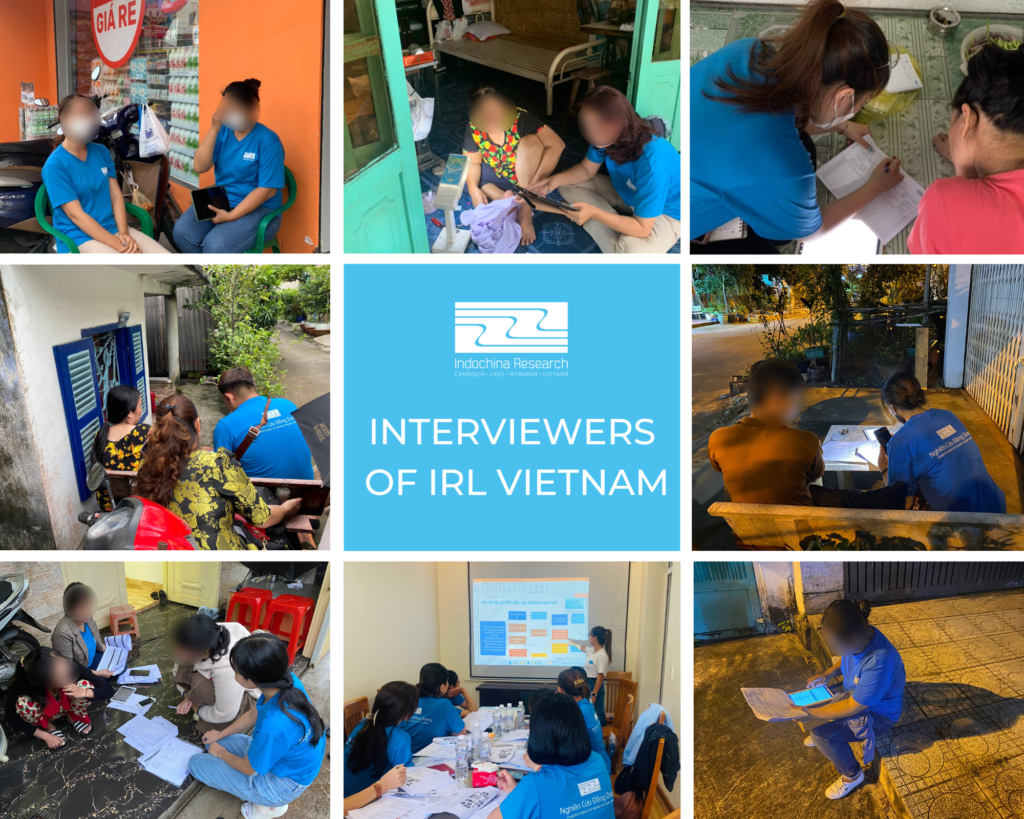
Women spend nearly three times more time on unpaid housework compared to men
The outcome revealed a notable contrast in the allocation of time between males and females in terms of both compensated and uncompensated tasks:
- Women work more hours, but men earn higher income. On average, men have one extra hour of paid work per day compared to women, while women dedicate nearly three additional hours to unpaid work such as cooking, cleaning, etc.
- Almost all women engage in daily housework, but only 55% of Vietnamese men do.
- Care work is predominantly carried out by women, with 45% of Vietnamese women taking on these responsibilities compared to 24% of men.
- Due to dedicating a substantial portion of their time to household chores, approximately one-third of women have limited time for personal care, eating, and sleeping on an average day. In contrast, men allocate nearly an additional hour per day compared to women for these activities.
Indochina Research Vietnam – Nationwide Data Collection Agency in Vietnam Time Use Survey
The findings of the survey and the public data will contribute to a better understanding of gender disparities by examining the time dedicated to paid and unpaid work, as well as the organization of household chores. This information will be valuable for researchers and policymakers in formulating recommendations to address time constraints faced by women, such as reducing the burden of unpaid care work, and ultimately, promote gender equality in Vietnam by developing new services related to childcare and elder care as example.
For any questions, feel free to contact us, or read our publications at https://indochina-research.com/news/
For further reference, please read:
- Vietnam – Time-Use Survey 2022, access at https://microdata.worldbank.org/index.php/catalog/5844?fbclid=IwAR0VTUle0Bt9T_ide7wwXGGsHUoeOzXlZVy02FzU8ffElGMIzFseMetzNr8, 02 June 2023.
Please contact us for all your research projects in South East Asia
[email protected].
Indochina Research, Regional know-how you can trust!
The post Indochina Research Vietnam and Vietnam Time Use Survey 2022 by World Bank appeared first on Indochina Research.
]]>